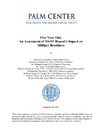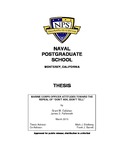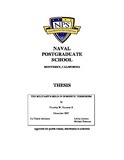One Year Out: An Assessment of DADT Repeal’s Impact on Military Readiness
| dc.contributor.author | Belkin, Aaron | |
| dc.contributor.author | Ender, Morten | |
| dc.contributor.author | Frank, Nathaniel | |
| dc.contributor.author | Furia, Stacie | |
| dc.contributor.author | Lucas, George R. | |
| dc.contributor.author | Packard, Gary | |
| dc.contributor.author | Schultz, Tammy S. | |
| dc.contributor.author | Samuels, Steven M. | |
| dc.contributor.author | Segal, David R. | |
| dc.date | September 20, 2012 | |
| dc.date.accessioned | 2023-03-16T23:40:07Z | |
| dc.date.available | 2023-03-16T23:40:07Z | |
| dc.date.issued | 2012-09-20 | |
| dc.identifier.citation | Belkin, Aaron, et al. One year out: An assessment of DADT repeal's impact on military readiness. Palm Center, CLA School of Law, Los Angeles,CA | en_US |
| dc.identifier.uri | https://hdl.handle.net/10945/71712 | |
| dc.description.abstract | Prior to the repeal of “don’t ask, don’t tell” (DADT) on September 20, 2011, many observers predicted that allowing lesbian, gay and bisexual (LGB) troops to serve openly would harm the military. This study is the first scholarly effort to assess the accuracy of such predictions about the impact of DADT repeal on military readiness. Our conclusions are based on a consideration of all of the evidence that was available to us at the time our research was conducted, the half- year period starting six months after repeal and concluding at the one-year mark. We sought to maximize the likelihood of identifying evidence of damage caused by repeal by pursuing ten separate research strategies, each of which was designed to uncover data indicating that repeal has undermined the military. Our research strategies included outreach to 553 generals and admirals who predicted that repeal would undermine the military, to all major activists and expert opponents of DADT repeal and to 18 watchdog organizations, including opponents and advocates of repeal, who are known for their ability to monitor Pentagon operations. In addition, we conducted in-depth interviews with 18 scholars and practitioners and 62 active-duty heterosexual, lesbian, gay and bisexual troops from every service branch, as well as on-site field observations of four military units. We analyzed relevant media articles published during the research period, administered two surveys and conducted secondary source analysis of surveys independently administered by outside organizations. Our vigorous effort to collect data from opponents of DADT repeal, including anti-repeal generals and admirals, activists, academic experts, service members and watchdog organizations, should sustain confidence in the validity and impartiality of our findings. Our study team includes distinguished scholars from the US Military Academy, US Air Force Academy, US Naval Academy and US Marine Corps War College, as well as scholars with internationally recognized expertise on the issue of gays in the military. Several members advised the Pentagon’s 2010 DADT working group, and one member led the team that drafted the Defense Department’s plan for implementing DADT repeal. | |
| dc.format.extent | 51 p. | |
| dc.publisher | Palm Center | en_US |
| dc.rights | This publication is a work of the U.S. Government as defined in Title 17, United States Code, Section 101. Copyright protection is not available for this work in the United States. | en_US |
| dc.title | One Year Out: An Assessment of DADT Repeal’s Impact on Military Readiness | en_US |
| dc.type | Report | en_US |
| dc.contributor.corporate | Naval Postgraduate School | |
| dc.contributor.department | Business and Public Policy (GSBPP) |





